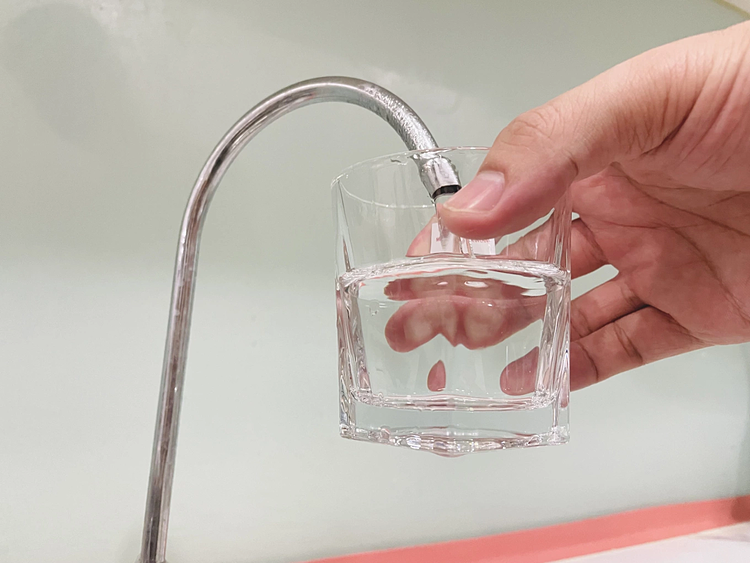The Hanoi-based graphic designer admitted to drinking only 500-700 ml of water daily, far less than the recommended 1.5-2 liters. Some days, engrossed in work, he would forget to drink anything all afternoon. "My air-conditioned office keeps me cool, so I rarely feel thirsty," Thanh explained.
He also had a habit of drinking strong coffee every morning. Despite occasional headaches, fatigue, and dark urine, Thanh dismissed these as work-related stress. After weeks of persistent lower back pain and infrequent urination, he went to Hanoi Medical University Hospital for a check-up. The diagnosis of early-stage kidney failure, with elevated creatinine levels indicating reduced kidney function, came as a shock.
Thanh confessed to his doctor that, besides low water intake, he frequently held his urine. The doctor concluded this habit contributed to his kidney damage, explaining that holding urine causes it to stagnate in the bladder, increasing the risk of infection spreading to the kidneys. Thanh received medication and advice on lifestyle changes.
Thanh's case is not unique. Dr. Nguyen Van Thanh, Deputy Head of the Nephrology-Urology Department at Hanoi Medical University Hospital, has seen many young patients with kidney failure due to unhealthy habits, including insufficient water intake and holding urine. One 20-year-old woman admitted, "I only drink water when I'm thirsty, preferring coffee and strong tea."
Her life revolved around studying during the day, working at night, and grabbing quick meals of bread, sausages, and instant noodles. When she experienced painful urination, she attributed it to stress and self-medicated with antibiotics from a pharmacy.
She only sought medical attention when she began experiencing nausea, fatigue, insomnia, and changes in taste. Dr. Thanh diagnosed her with end-stage renal disease, with kidney function below 10%. She requires immediate dialysis and is awaiting a kidney transplant.
Dr. Thanh emphasized that an unhealthy lifestyle is a major contributing factor to kidney disease, particularly insufficient water intake and habitually holding urine.
 |
Chronic dehydration reduces blood flow to the kidneys, leading to chronic kidney disease. Photo: Tan Vu T-clean |
Vietnam has an estimated 8.7 million people with chronic kidney disease, representing 12.8% of the adult population. Alarmingly, the rate among those under 40 is rising rapidly. At major dialysis centers like Bach Mai Hospital, young patients make up 20-30% of those on regular dialysis.
Kidney failure is particularly dangerous because early stages often have no clear symptoms. Many young, seemingly healthy individuals discover the condition incidentally during general health check-ups. By the time symptoms like swelling, infrequent urination, nausea, and fatigue appear, significant kidney damage has already occurred. Treatment at this stage focuses on preserving remaining kidney function, not restoring it fully.
In addition to underlying kidney conditions, hypertension, and diabetes, unhealthy lifestyle choices, especially low water intake and holding urine, contribute to kidney failure.
Dr. Ngo Thi Kim Oanh, from the University of Medicine and Pharmacy at Ho Chi Minh City - Campus 3, explains that kidneys need sufficient water to filter blood and remove waste products through urine. Inadequate water intake concentrates urine, increasing the risk of kidney stones and reducing the body's ability to eliminate toxins.
Many people only drink when thirsty, but thirst is a late sign of dehydration. Prolonged dehydration reduces blood flow to the kidneys, damaging kidney tissue and leading to chronic kidney disease. Substituting water with coffee, strong tea, sugary drinks, or energy drinks can have a mild diuretic effect, exacerbating chronic dehydration if not compensated for with sufficient water intake. Caffeine, sugar, and additives also increase the metabolic burden on the kidneys.
A study published in the American Journal of Nephrology found that those who drink less than one liter of water daily have a 50% higher risk of kidney stones compared to those who drink enough. Dr. George Bakris, a nephrologist at the University of Chicago (USA), notes that waiting until thirsty to drink can increase blood osmolality, forcing the kidneys to work harder to filter toxins.
Experts recommend 2-3 liters of water daily for healthy kidneys. However, surveys in major cities reveal that only about one-third of young people meet this recommendation. This chronic shortfall increases urine concentration, promoting mineral precipitation and stone formation.
Furthermore, the common practice of holding urine, especially among office workers, allows urine to stagnate, creating a breeding ground for bacteria and increasing the risk of kidney infections, according to Dr. Mai Van Luc from the Department of Urology and Andrology at E Hospital.
The bladder acts as a reservoir for urine, expanding when full and contracting when empty. A normal, healthy adult bladder can hold 500 ml of urine.
However, the urge to urinate typically occurs when bladder volume reaches 300-400 ml. A person usually urinates no more than 6-7 times a day with normal fluid intake.
Frequently or prolonged holding urine can cause backflow into the kidneys, leading to chronic kidney inflammation and potentially kidney failure. It also creates a favorable environment for bacterial growth in the bladder, causing bladder infections and even acute pyelonephritis if bacteria ascend to the kidneys.
Experts emphasize that seemingly minor habits, when repeated, can have significant consequences for kidney health. Therefore, in addition to adequate hydration and a balanced diet, recognizing and adjusting daily urination habits is crucial for protecting kidney health.
Thuy Quynh












